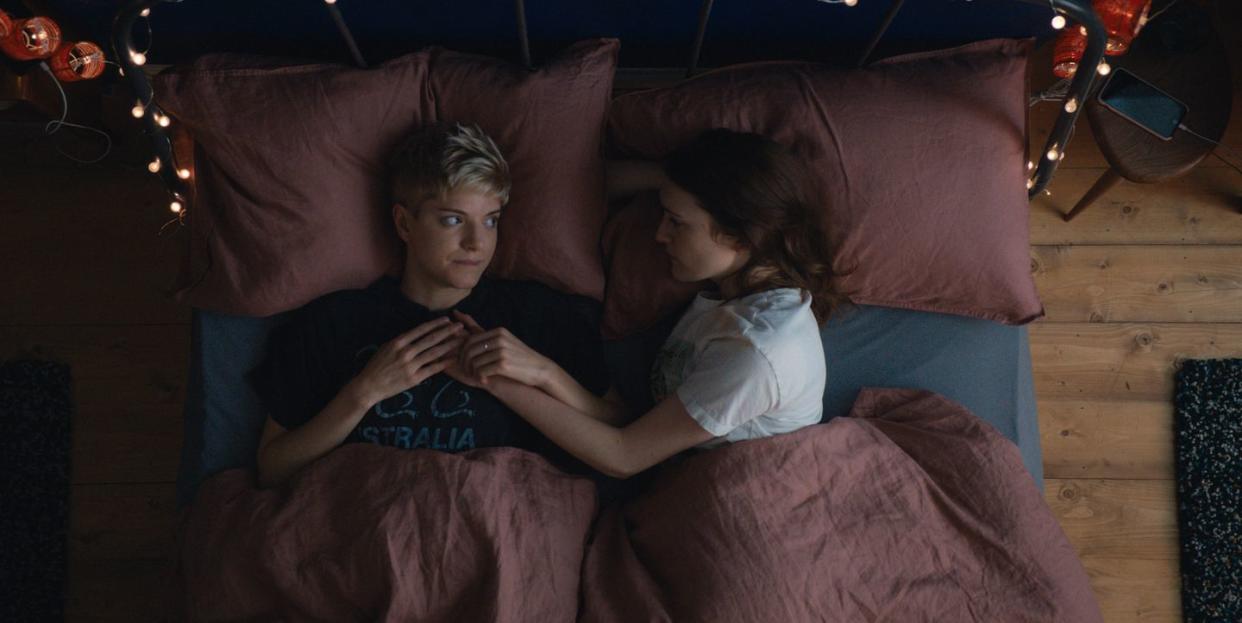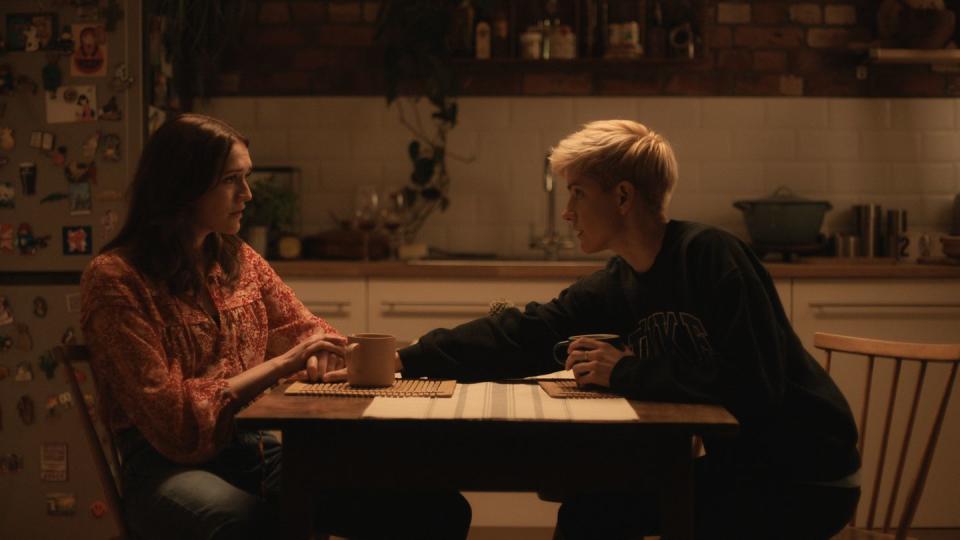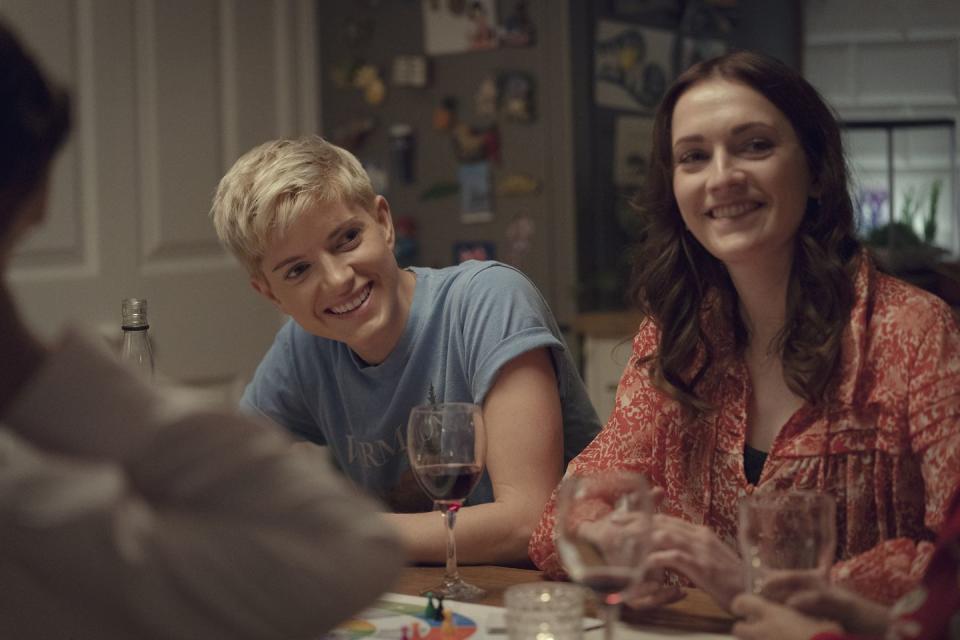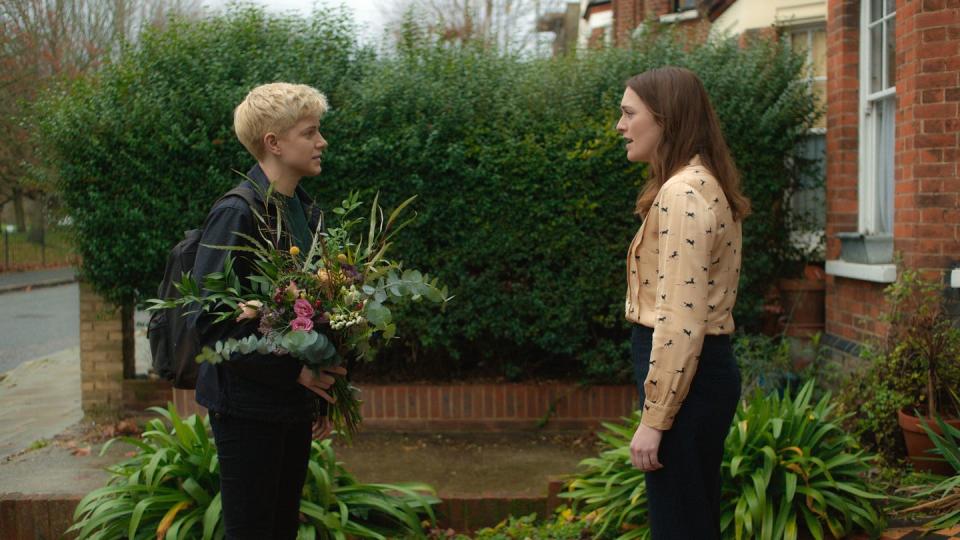'Feel Good': Mae Martin and Charlotte Ritchie Are Figuring It Out in Real Time

Mae Martin and Charlotte Ritchie are trying to explain the new series of their comedy-drama Feel Good, and they're struggling. Martin has a crack at it, and turns to Ritchie. "Basically, right?"
"Right," says Ritchie. "Or is that a different show?"
"They're at Central Perk," says Martin.
"They're at Centre Parcs," says Ritchie. "I'm desperate to go Centre Parcs. Desperate. Seriously. I need to start getting on, like, promotional stuff. I need to start selling my soul a bit to get free tickets to Central... Central Perk. Sorry."
You'd think, between being in the BBC's very popular and very, very good haunted house sitcom Ghosts as well as the last series of Taskmaster, she'd aim a bit higher. But no: it's Centre Parcs or bust.
"No, I'm not kidding. It's one of my life's dreams, to go Centre Parcs."
To be fair, it's a tough question: Feel Good is about a lot of things at once. It follows the cresting and crashing of a relationship between stand-up comedian and recovering cocaine addict Mae Martin (a slightly-more-than-semi-autobiographical role for Martin, though Feel Good's Mae is earlier on the route to working out being non-binary than the real Martin) and fretful secondary teacher George (Ritchie), who's hitherto thought of herself as straight.
They broke up almost by accident at the end of the last series; at the start of the new one, Mae and George are apart and still not quite sure what they want. While George mopes with her cosmic flatmate Phil (American cult comic Phil Burgers), an old friend from Mae's past opens up doors that had been long closed.
"They're in different countries and they're in a kind of ambiguously broken up place but I think both still yearning for each other, and then slowly are trying to make their way back to each other," says Martin.
The first series pivoted on Mae's wavering commitment to sobriety and George's gradual, grudging trajectory out of the closet. This time around it's unaddressed past trauma, the future of the planet, and what happens when bearing your soul through your art is also the way that you get on TV. Martin and their Feel Good co-writer and co-creator Joe Hampson avoid cut-and-dried answers to any of the questions they ask. For Ritchie, that's one of the series' strengths.
"It's hard to publicly talk about things that you're not yet fully worked out on, but equally in a different context or just in general, it's always helpful to hear from people who are working things out because that, as I said, is how a lot of people feel and it's sometimes harder to hear from people who have it all worked out because you wonder, 'How did you get there?'"
Equally as importantly, though: Feel Good is really, really funny. A lot of that's down to the easy friendship Martin and Ritchie share. They try to work out what they like most about each other's performances.
"I worry that if you get me started it’ll just spiral," says Martin. Ritchie wrestles a little.
"Oh, it’s hard to explain, but the real connectedness, and sense of spontaneity in the moment. It felt like you were different every take, which is really the whole aim. Then you end up reacting to each other very naturally." She pauses. "So yeah, kind of the same thing, actually, back at you."

Mae and George's is less a will-they-won't-they relationship, and more of a should-they-shouldn't-they. Where do you stand on it? Should they be together?
MM: I think it changes episode by episode. And I like that it's, even at the very end, I think, kind of open to interpretation. I'm rooting for them, because I think they're really in love. And that kind of love is hard to find. However, I think the main message of the show is that that has to be a choice that you make every day based on whether it's making you happy, and whether your needs are being met, and you're able to meet the needs of someone else. So I think they're trying to get to that place where they're choosing to be with each other rather than compelled to be with each other because of a gaping chasm of insatiable need.
CR: Yeah. I think there's definitely a danger in falling into relationships based on a lack in yourself. And you need to be fully whole, I think, yourself to enjoy that sort of stability. But actually: hot take from me today – just today, I don't know if I'll feel differently tomorrow. But considering the amount of work they put into the relationship, like the ways in which they continuously strive to try and make it all work, and the rough times they go through, many people can't do that. And the first hurdle they're like, 'Ahh, too complicated, no thanks'. Like, 'This isn't easy, so I'm out'. And I think there's a real strength there. And actually, thinking about it, they have a really good chance if they're willing to kind of be awful in front of each other. And they're their worse sides and still manage to kind of have some lovely times. I think it's quite an interesting example. Most relationships aren't really just smooth sailing.
Ambiguity is a big theme this series, and the idea that things not being one thing or another, or defined as one thing or another, is okay.
MM: Yeah, being comfortable with ambiguity is important to me and sort of rejecting the pressure that you have to come down hard on one side or another and have a definitive point of view about everything.
CR: Yeah. And I guess there's a bit of humility in saying you don't know. There's a power to that. I think it's cathartic for people to watch as well, because I think that many people – I don't wanna speak for anybody – I definitely know that I often feel a little lost in most things. And I think that that's possibly more likely to be most people's experience. So I think that there's a real sort of empathy in that writing.
MM: I hope there are no good guys and bad guys, that your allegiance shifts between characters and hopefully people can empathise with even the bad, the tough situations.

And it's interesting, you mentioned catharsis – obviously Mae the character mirrors a lot of yourself in loads of different ways. Is writing about this and some really complex themes cathartic? Is it helpful, or is it...
MM: Or re-traumatising? I think in season one, because the external pressures that the characters were facing were things like addiction.... it felt like I was writing about issues that I have a lot of distance from and so it was cathartic in a way. And season two felt a lot more like it was me figuring it out in real time, and saying things that I haven't said before or to other people or to my therapist. So that was less cathartic and more like [Martin makes a slightly icked-out, slightly terrified noise]. But ultimately, I'm sure it will be positive.
Did you use any other duos or relationships as a touchstone for Mae and George’s dynamic?
MM: Mostly, I think Joe [Hampson, co-creator and co-writer of 'Feel Good'] and I both drew from personal experience and relationships. I know Joe really identifies with George at times and so do I [in] some of it. And relationships our friends have had. So yeah, I think it's a combination of things and the main objective is just to be realistic.
As you’re a gigantic Beatles fan I had a running theory that there was a bit of the John-Paul relationship in there.
MM: Oh interesting! Interesting. I’m trying to think who would be who. Mae to me would be Paul, because Paul’s the romantic. But then John’s got the edge… no, I can’t. I feel too invested in that analogy to think about it.
I was thinking Paul McCartney’s a doer like George – she’s trying to keep the whole thing moving. And Mae uses pain and trauma and turns it into her art in the way John did.
MM: That’s interesting. And Phil’s a bit of a George [Harrison] isn’t he? Very meditative.
Why is a sitcom-slash-comedy-drama the best place to talk about complicated things like this?
MM: There’s lots of formats that do deal with those things successfully – what I like about a narrative thing is the richness of it, and being able to see somebody’s whole world and I think that when you can identify with somebody and empathise with them it’s a lot easier to understand some of these things which on paper you might feel you wouldn’t relate to, but of course we all do.
CR: I think also there’s a real truth that in life there’s a lot of jokes, and actually more than anything we use humour as a deflection technique and I think that that’s so much more realistic in some ways than people being articulately written. So much of the time when you’re uncomfortable or you don’t know what to say or you feel like things are going wrong you’ll make a joke to alleviate the situation rather than necessarily launching into a full-scale argument. People don’t always have the mettle for that and actually so much more often they’ll divert into humour, and personally I’m such a big fan of the genre in general because it feels more true to life.
MM: Definitely. I think if I was trying to write just a drama, it’d feel like I had conspicuously and consciously omitted all the natural humour that there is in life.
CR: And Mae’s a comedian in the show. You’ve gotta have a bit of comedy!
That’s the thing – a lot of the chat around Feel Good leans towards the heavier side of it, but it’s really funny.
MM: Charlotte and I were saying – there are these themes, these buzzwords and things that journalists hit, and want to tap into the heavier themes and it’s so crucial to remind people that this is a comedy about a relationship and it’s a world that you want to be in, I hope.
Does the title Feel Good mean something different this series?
MM: I think it’s always meant for me, in a kind of empathetic way, that that’s just what we’re all trying to do all the time: we’re trying to feel good and therefore we often self-soothe in ways that are bad for us or we make mistakes. Particularly with addiction I think that it’s… if you break it down and think what people are trying to do is to feel better, because they don’t feel good, then that’s something you can really empathise with.
CR: I think also it’s really interesting that it’s really impossible to always feel good. I think it’s an unattainable goal to feel good all the time, and people – especially in this culture – are really uncomfortable with the downer moments of life, but it really is in those moments that you learn. So ironically it’s often when the characters aren’t feeling good that they have the biggest revelations.

Charlotte, there are some great descriptions of George in the show: "a little kidney bean"; "a cocker spaniel"; "dangerous Mary Poppins"; "the archangel Gabriel". How does it feel having those thrown at you?
CR: Obviously the archangel Gabriel is incredible. ‘Kidney bean’ feels extremely complimentary, even though I think for a lot of people it could be extremely insulting. They make me laugh so much.
MM: Fit squirrel.
CR: A fit little squirrel, thank you for that. It’s funny, it’s only when you asked me just then, but when I heard them in the script, I really think Mae’s talking about George – I don’t associate them with myself. Obviously that doesn’t make that much sense, but when I hear ‘fit squirrel’, I’m like that’s so sweet, George is a fit squirrel – but now I’m like, that’s what you and Joe think of me. They’re good with words, these guys! Good with words.
This is very much an aside, but Charlotte: do you recall very much your time as an uncredited extra on Harry Potter and the Goblet of Fire?
CR: Yeah, I remember every detail of it. It was one of the most remarkable experiences. What I couldn’t believe was that one of the actors – I won’t name who, but not the main character – hadn’t read the books. And I remember thinking, if you only knew how I knew about it. I got in trouble because I was putting my hood over my head pretending to be a Dementor, and then they came around with safety pins for everybody. But also what’s funny about that as an acting experience, was that I genuinely thought everyone else was getting it wrong and was under-acting. I was like, ‘These clowns have no idea what they’re doing!’ And it wasn’t until I was at the Streatham Odeon in the front row with 10 of my friends, and I come onscreen, and it [became] quite clear who’s over-acting and who’s acting appropriately. My eyebrows – it’s like Professor Mad-Eye Moody cast a spell on my eyebrows. They’re dancing up and down. Atrocious. I really remember thinking, ‘Right, I’ve got the wrong end of the stick here.’ That was a big learning for me.
One of the big questions Mae and George debate is whether the world’s worth saving. What do you reckon?
CR: Oh boy.
MM: I’ve got a stand-up show that I’m working on and about to tour which is very much about that pull between optimism and pessimism. It feels like to be optimistic, you have to filter out every piece of information which comes your way, but then it feels like such a failure to be pessimistic. Obviously there’s hope and human beings I think are good, deep down. Like the rest of the show, I oscillate.
CR: I feel it’s worth saving.
MM: Definitely worth saving.
CR: No, Mae, you want to explode it.
MM: It’s worth saving! I just oscillate between whether it’s saveable [or not]. Hopefully people can relate to being inundated by bad news this year and trying to stay afloat.
CR: I read a good book recently, part of a book. A headline about a book. No, I did the modern thing of reading a book and reading a bit of an article about a book. And it was about how history actually is a good example of humans continuously working on their cohabitation in a positive way, and I’m not sure I agree but I like the thought that maybe there are more examples of goodness than bad acts in the world. I don’t know if that’s true, but I’m hoping that will be the case as we move forward and try to work a bit harder at being more inclusive and better people.
Both series of Feel Good are on Netflix from today
Like this article? Sign up to our newsletter to get more articles like this delivered straight to your inbox
Need some positivity right now? Subscribe to Esquire now for a hit of style, fitness, culture and advice from the experts
You Might Also Like

